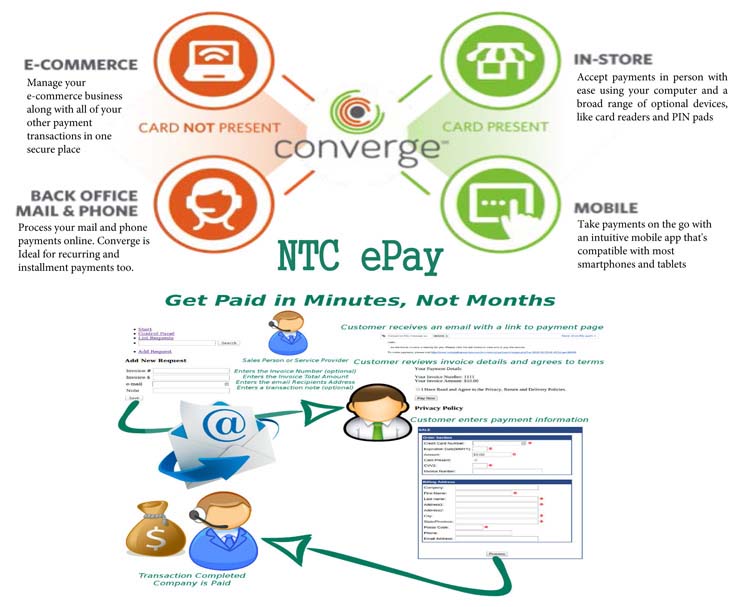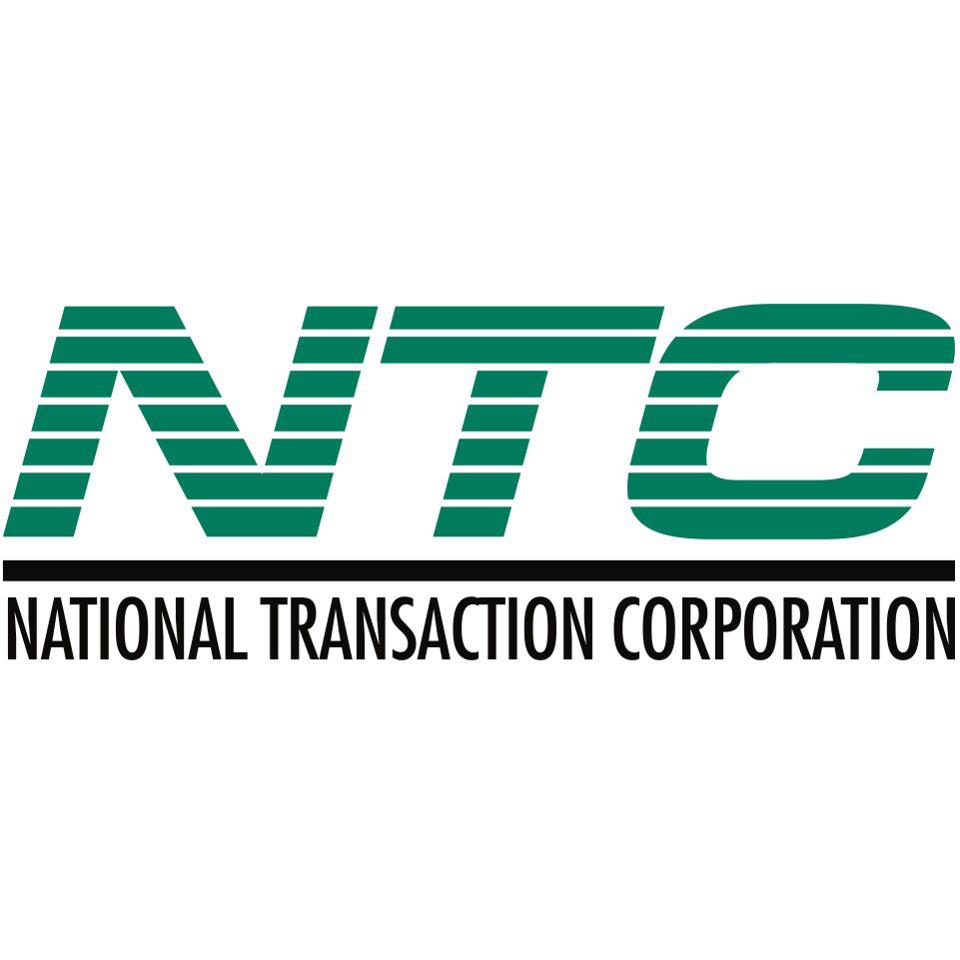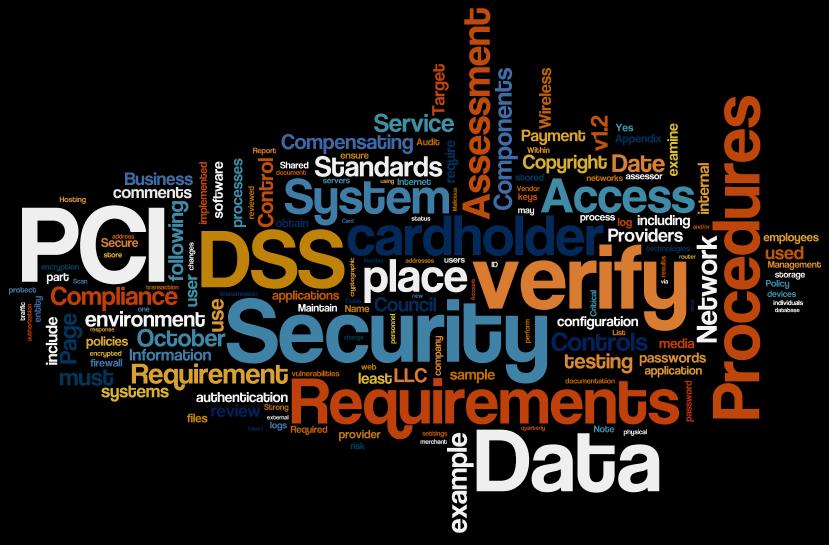
February 16th, 2016 by Elma Jane
NTC ePay is an easy and effective way to process transactions for any Merchants.
National Transaction creates a custom link for your business, which you will use to send your customers an Electronic Invoice. Once your customer received the invoice, they will click on the link and pay the amount on the invoice.
The customer is required to agree to your Refund Policy, Privacy Policy, Timing and Delivery Policy before they can pay the invoice, this will protect you in a case of a Chargeback.
With this system in place, Credit Card information is processed securely. The customer is entering their credit card information without faxing or emailing credit card numbers.
Electronic Invoicing saves time and unnecessary costs. Documents don’t need to be scanned or email, all transactions are processed through the electronic invoice making it easy to keep track of.
Most of our Merchants using NTC ePay are in the Travel Industry, some are into boat Repair Business and Church Ministries. If you want to process securely, save time and unnecessary costs like our existing merchants, check out NTC ePay, The No Shopping Cart e-Commerce Solution!
Posted in Best Practices for Merchants, e-commerce & m-commerce, Travel Agency Agents Tagged with: credit card, customers, e-commerce, Electronic Invoice, merchants, transactions, travel, travel industry

February 3rd, 2016 by Elma Jane
A group of Travel Organizations is urging Congress to create a national commission to study airline competition, after a decade of consolidation and a year of record profits.
A similar commission gauged the Industry’s Health in 1993. But groups including the Travel Technology Association, Airports Council International-North America, the U.S. Travel Association and the American Society of Travel Agents (ASTA) contend that much has changed in the last quarter-century and the industry deserves a new look.
The recent series of mergers has left relatively few major airlines in control of the industry. Along with Southwest, the remaining three legacy carriers have about 80 percent of the market share for flights within the U.S. Ultra-budget airlines like Spirit, Frontier and Allegiant have provided some competitive fares on select routes, but their presence is not big enough to really affect the whole marketplace.
Lack of domestic competition is not the only issue that traveler and travel agent advocates want the government to look at. U.S. carriers are also forming alliances with international airlines that go beyond basic code sharing agreements. For example, American Airlines and LATAM have inked a deal and are waiting for regulatory approval that would allow them to set prices and schedules on routes between the North and South Americas and easily use each other’s networks to offer connecting flights to their customers.
Other subject that the groups would like to study include:
Agreements with 100 other countries to allow unhindered international travel, under a policy called Open Skies.
Topics above are worth exploring to better understand the competitive landscape of Air Travel in the U.S.
Posted in Best Practices for Merchants, Travel Agency Agents Tagged with: Air Travel, ASTA, international travel, travel, travel agents, Travel Association, Travel Organizations, Travel Technology, traveler

February 2nd, 2016 by Elma Jane
Businesses continue to struggle with the prohibited storage of unencrypted customer payment data. The Payment Card Industry Data Security Standard (PCI DSS), merchants are instructed that, Protection methods are critical components of cardholder data protection in PCI DSS Requirement.
PCI DSS applies to every company that stores, processes or transmits cardholder information. Regardless of the size or type of business you operate, the number of credit card transactions you process annually or the method you use to do so, you must be PCI compliant.
Data breach is not a limited, one-time occurrence. This is why PCI compliance is required across all systems used by merchants.
Encryption and Tokenization is a strong combination to protect cardholder at all points in the transaction lifecycle; in use, in transit and at rest.
National Transaction’s security solutions provide layers of protection, when used in combination with EMV and PCI-DSS compliance.
Encryption is ideally suited for any businesses that processes card transactions in a face to face or card present environment. From the moment a payment card is swiped or inserted at a terminal featuring a hardware-based, tamper resistant security module, encryption protects the card data from fraudsters as it travels across various systems and networks until it is decrypted at secure data center.
Tokenization can be used in card not present environments (travel merchants) such as e-commerce or mail order/telephone order (MOTO), or in conjunction with encryption in card present environments. Tokens can reside on your POS/PMS or within your e-commerce infrastructure at rest and can be used to make adjustments, add new charges, make reservations, perform recurring transactions, or perform other transactions in use. Tokenization protects card data when it’s in use and at rest. It converts or replaces cardholder data with a unique token ID to be used for subsequent transactions.
The sooner businesses implement encryption and tokenization the sooner stored unencrypted data will become a thing of the past.
Posted in Best Practices for Merchants, Travel Agency Agents Tagged with: card, card data, card present, cardholder, compliance, credit card, customer, data, data breach, data security, e-commerce, EMV, encryption, Mail Order/Telephone Order, merchants, moto, payment, Payment Card Industry, PCI-DSS, POS, secure data, Security, terminal, tokenization, tokens, travel, travel merchants

February 1st, 2016 by Elma Jane
What is Zika Virus?
The Virus has been around for a long time, and for the most part was a benign mosquito-borne disease. Zika is transmitted through infected Aedes mosquitoes and can be passed from a pregnant mother to her baby during pregnancy or around the time of birth. It has spread from equatorial Africa into South and Central America as well as the Caribbean.
Recently in the last month, the virus was linked to microcephaly in infants. From October 2015 to January 2016, there were almost 4,000 cases of babies born with microcephaly in Brazil. Before then, there were just 150 cases per year.
The Centers for Disease Control and Prevention (CDC) has issued a travel alert that recommends pregnant women postpone travel to areas where the virus has been reported.
Affected areas
While Zika typically was found in equatorial Africa, the disease has spread and now threatens the bread and butter of most travel professionals in the United States. The affected areas include most of South America, in particular Brazil who is hosting the 2016 Summer Games, and the Caribbean, including several popular tourist destinations.
Airlines took note of this potential threat
Airlines offered refunds to travelers with concerns of the Zika Virus.
The key for travel agencies right now is to keep abreast of the virus and monitor it’s spread via the Centers for Disease Control and Prevention (CDC).
Contact your preferred suppliers who service destinations that are impacted and become familiar with their cancellation policies.
Be prepared to offer your clients some alternative destinations. One of the best options might be a cruise versus the destination. A cruise might be the answer for your clients as a ship can change itineraries on a moment’s notice.
Posted in Best Practices for Merchants, Travel Agency Agents Tagged with: travel, travel agencies

January 27th, 2016 by Elma Jane
MasterPass To Make Booking Travel Experience Even Easier For JetBlue
MasterCard today added JetBlue as its latest merchant to accept digital payments with MasterPass. MasterPass will be available later this year on the airline’s website and mobile app, giving customers the opportunity to speed up their booking travel experience, according to a press release.
With MasterPass, shoppers can pay for the things they want at thousands of merchants with the security they demand, anywhere online or in app, using any device. The wallet securely stores shoppers’ preferred payment and shipping information which is readily accessible when they click on the “Buy with MasterPass” button and sign into their account.
U.S. consumers can sign up for a MasterPass account by visiting the MasterPass website or through a participating bank. Launched in 2013, MasterPass by MasterCard is free, easy to set up, and available anywhere you see the Buy with MasterPass button. It is currently available in 29 countries and is accepted at 250,000 merchants globally.
Accepting MasterPass by MasterCard on JetBlue’s online and in-app properties expands the relationship between the two companies. JetBlue announced in October 2015 that MasterCard would be its network partner for its co-brand portfolio.
Posted in Travel Agency Agents Tagged with: bank, customers, digital payments, merchant, mobile, mobile app, online, payments, Security, travel

January 25th, 2016 by Elma Jane
New Timeframes for Electronic Gift Card Orders
Please be aware that NTC’s Electronic Gift Card (EGC) Design & Artwork team has upgraded their printers. The new timeframes for both FanFare and EGC (Givex) gift card shipments during non-peak times are the following:
- Standard Card Orders: 8 Business days, plus 2 Day Delivery
- Custom Card Orders: 12 Business days, plus 2 Day Delivery
Converge Mobile: Frequently Asked Questions
Will there be more EMV chip card readers in the future? Yes! Additional devices ranging in price points and feature/functionality will be introduced throughout 2016.
Do VirtualMerchant Mobile login credentials work with Converge Mobile?Yes! The mobile login credentials that customers use today for VirtualMerchant Mobile are the same for Converge Mobile.
Is the talech iCMP the same as the one sold for Converge and Converge Mobile? No! Please use item code CICMP for devices that will be used with Converge and/or Converge Mobile. Otherwise, there is device reconfiguration work that has to take place resulting in a negative customer experience.
UPCOMING EVENTS
 
April 19-21 May 2-4
TRANSACT 16 (ETA) Southeast Acquirers Association (SEAA)
INDUSTRY LINKS
|
|
Posted in Best Practices for Merchants, nationaltransaction.com Tagged with: card, chip card, Electronic gift card, EMV, gift Card, merchant, mobile, payment, payment technology, processor, travel, travel industry

January 21st, 2016 by Elma Jane
Merchant accounts are as varied as the merchants themselves and the goods being sold.
What kind of account would you fall under:
High Risk Merchant Accounts – Finding a processor who is willing to take your account can be more challenging. High risk merchants range from travel agencies to multi-level marketing companies, credit restoration merchants, casinos, online pharmaceutical companies, adult/dating merchants and many other.
Internet based merchant account (Ecommerce/Website order processing) – E-Commerce is a booming market, with so many people buying and selling goods online due to the wide reach and easy access to the internet.
Mobile or Wireless merchant account – This merchant is specifically designed for small businesses, solo professionals, and mobile services (including lawyers, landscapers, contractors, consultants, repair tradesmen, etc), who are constantly on the move and require a payment to processed on the spot.
MOTO (Mail or Telephone order) – This enables phone based or direct mail orders processing for customers who can buy your product or service from the comfort of their home. Since there is no card present there is no need for traditional equipment.
Multiple Merchant Accounts – Some businesses can have merchant accounts of a couple or all different types. Merchants who fall into this category are called multi-channel merchants as they sell their goods through a number of different channels. Most commonly this is related to retail stores who also have an online presence to sell their goods. This is very common in today’s competitive market where constant contact with customers is critical to success.
Traditional Account with Equipment – Most commonly used for retail businesses (grocery, departmental stores etc) where the transactions are processed in a face to face interaction also known as Point of Sale (PoS).
Interested to setup an account give us a call at 888-9962273
Posted in Best Practices for Merchants, e-commerce & m-commerce, Mail Order Telephone Order, Mobile Payments, Mobile Point of Sale, Point of Sale, Travel Agency Agents Tagged with: account, card, card present, credit, customers, e-commerce, high risk merchant, internet, merchant accounts, merchants, mobile, mobile services, moto, multi-channel merchants, payment, point of sale, POS, processor, transactions, travel, travel agencies

January 14th, 2016 by Elma Jane
We would like to let our customers know of additional benefits that are coming, in addition of the protection that chip card technology provides.
On January 24, Verifone will release a software update for your card terminal that will include two important new features:
- PIN Debit: With this feature, when your customer pays with a Visa, MasterCard or Discover chip debit card, your terminal will allow you to process it as a debit transaction. The update will change the prompts you’re used to seeing based on how the card is configured.
- Tip Adjust: If your business accepts tips, you will now have the option to add the tip at the time of sale or adjust it later, just like with non-chip card transactions. To use the tip adjust feature, simply skip the tip prompt during the sale.
Once the download is available, your card terminal will automatically receive the new application during its monthly update. For best results, leave your terminal on overnight to ensure it receives the update.
We appreciate your business and we are committed to providing you with solutions to ensure your ongoing transition to chip card acceptance is smooth.
For more information on terminal upgrade, please visit www.chipcardsuccess.com.
Start accepting credit card payments at your business with the following features on your new POS terminal: NFC + EMV PIN & Signature capable. Give us a call now at 888-996-2273 or visit our website www.nationaltransaction.com Payments Expert for Travel Merchants and more!
Posted in Best Practices for Merchants, EMV EuroPay MasterCard Visa, Near Field Communication, Point of Sale, Travel Agency Agents, Visa MasterCard American Express Tagged with: card, customers, EMV, MasterCard, merchants, nfc, payments, POS, transaction, travel, visa

January 13th, 2016 by Elma Jane
If you’re a travel merchant or any merchants using Internet Explorer we want to share this information with you.
As Microsoft ends support for anything older than Internet Explorer 9 (IE9), security experts urged IT managers to migrate to newer versions of Internet Explorer to avoid risk exposing themselves to a new wave of attacks.
Back in August 2014, IEBlog shared important information on migration resources, upgrade guidance, and details on support timelines.
After January 12, 2016, only the most recent version of Internet Explorer available for a supported operating system will receive technical support and security updates.
Vista SP2 and Server 2008 SP2 users will only be supported on IE9; Windows 7 SP1, Windows Server 2008 R2 SP1, Windows Server 2012 R2 and Windows 8.1 users will need to upgrade to IE11; and Windows Server 2012 customers will need to migrate to IE10.
This will apparently ensure they get the benefit of Microsoft security updates and technical support.
Internet Explorer is one of the most commonly targeted platforms in the world for cyber-criminals, businesses would do well to get their house in order. Staying on unsupported versions will have a serious impact on your business.
To know more about Support Lifecycle Information click here
Posted in Best Practices for Merchants Tagged with: merchants, travel, Travel Merchant

January 12th, 2016 by Elma Jane
Can we securely store card data for recurring billing?
PCI DSS discourages businesses from storing credit card data, Merchants feel the practice is necessary in order to facilitate recurring payments.
The Payment Card Industry Data Security Standard (PCI DSS) is a proprietary information security standard for organizations that handle branded credit cards from the major card schemes including Visa, MasterCard, American Express, Discover, and JCB.
In order for the electronic storage of cardholder data to be PCI Compliant, appropriate encryption must be applied to the primary account number (PAN). In this situation, the numbers in the electronic file should be encrypted.
All PCI controls would apply to the environment in which the cardholder data is transmitted and stored. Tokenization can be implemented for recurring and/or delayed transactions. Travel Merchants and or Storage Facility could use this feature to help reduce the need for electronically stored cardholder data while still maintaining current business processes.
The best thing you can do for your business is to not store any cardholder data or personally identifiable information.
Tomorrow let’s tackle Encryption and Tokenization a strong combination to protect card data while reducing the cost of compliance!
Posted in Best Practices for Merchants, Credit card Processing, Credit Card Security, Payment Card Industry PCI Security, Travel Agency Agents, Visa MasterCard American Express Tagged with: cardholder data, credit card, data, merchants, payments, Security, tokenization, transactions, travel









